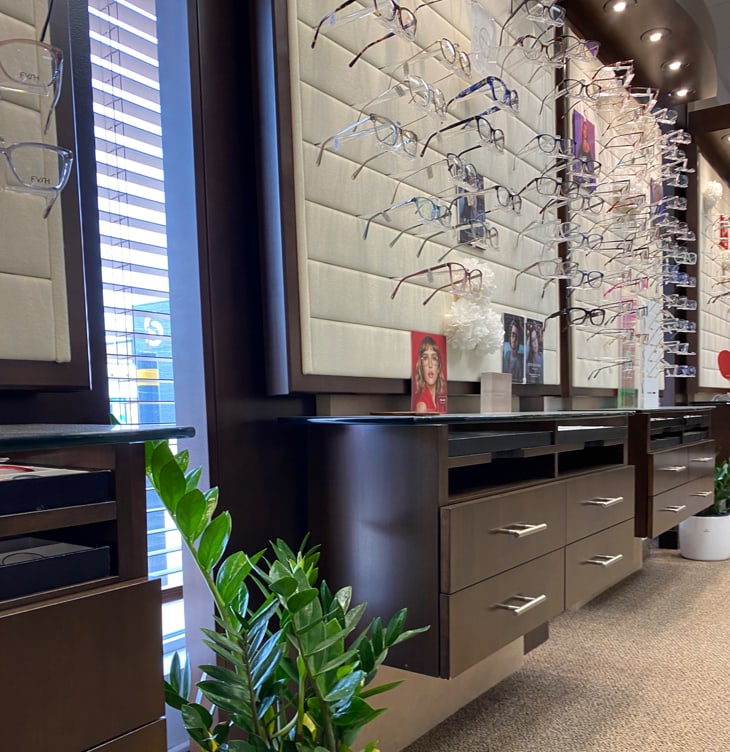- Dry Eyes
What Does Dry Eye Feel Like?
Dry eye often feels like a stinging, burning, or scratchy sensation in your eyes. […]
Everyone’s eyes are unique, and we’re here to help you find the ideal contact lenses that offer comfort and clarity. Whether you’re an athlete, need a custom fit, or want to explore new options, specialty lenses provide versatile solutions for an active lifestyle.
Our team will guide you through the entire process—from a thorough contact lens exam to a personalized fitting—helping you receive lenses that suit your needs.
Ready to experience the comfort of specialty lenses? Book your contact lens exam and fitting with us today, and let us help you find the perfect lenses to enhance your vision and lifestyle!

Specialty contact lenses encompass a group of highly customizable contact lenses that are designed for you only. They are coming in many different materials, in many different size and shapes and in many different ways to wear them. They are generally engineered to neutralize irregularities on the front surface of the eye, reducing optical aberrations that can’t be control with normal corrective device, thus enabling an improvement of vision. They are particularly appreciated for patients with keratoconus, corneal ectasia, corneal dystrophy, and corneal transplant. They can also be designed to reshape your eyes to correct myopia and/or control myopia progression. Refuse to accept less — don’t give up on contact lens wear. Specialty contact lens are tailored to you perfectly, and there is always a solution that can suit you.
Scleral Lenses and why we love them
It is non-equivocal that the most popular specialty contact lenses are the scleral lenses for improvement of vision and comfort and orthokeratology lenses for myopia control. Scleral Lenses are innovative lenses made of materials that are highly breathable and provide a thin cushion of fluid that stays between the lens and eye — making them very comfortable, reducing redness and creating a healthy environment for the eye. Every parts of the scleral lenses are customizable, allowing us as Doctor to design a lenses that is in sync with the morphology of your eye, landing softly on the white of your eyes. Patient diagnosed with keratoconus especially found a great relief and satisfaction with those lenses, improving their quality of life. You want to know more about scleral lenses, please watch What is a Scleral Lens?

Specialty contact lenses are designed for those with unique vision needs or lifestyle preferences.
Whether you’re dealing with an eye condition like astigmatism or dry eyes, or just want better comfort or clarity for activities like sports or long hours of screen time, our team is here to help. We’ll work with you to find the perfect fit tailored to your vision goals and daily life.
RGP lenses are breathable and can offer sharper vision, especially for people with mild astigmatism. They may feel slightly different from soft lenses, but their durability and clear vision make them a great option. RGP lenses can also help with moderate keratoconus, even when glasses don’t work.
Scleral lenses are larger than regular contacts and sit on the white part of the eye. These lenses are designed to help with corneal irregularities. They can be great for people with severe dry eyes who have trouble with traditional contacts. They might take some practice to insert, but the vision they offer can be life-changing.
Our team is experienced in fitting scleral lenses and RoseK2 gas permeable to address keratoconus and other corneal issues. We use advanced technology like OCT imaging to provide a precise, personalized fit based on your unique eyes. We’re here to help make sure you can see comfortably and clearly.

If you’re looking for a solution that offers comfort and clearer vision, we’re here to help. Book a consultation with our team to explore your contact lens options and get a personalized fitting tailored to your vision needs.
If you are a referring OD or ophthalmologist looking for a specialty lens for a patient, please fax a referral to 519-672-8235. We will then contact the patient to schedule a 30min specialty contact lenses consult to review the patient’s eye condition and discuss which specialty lens are best suited for this case. The commitment in terms of cost and necessary visits to ensure a safe and comfortable wear will then be reviewed as well as the vision expectations.
If you are a new patient looking to be fit with a specialty contact lenses, you can access our services in two ways.
a. By contacting our office to schedule a comprehensive eye examination. From there, we will be able to do the necessary tests and discuss with you the contact lenses options available to you.
b. If you have a corneal disease such as keratoconus, corneal dystrophy, dry eye, and corneal transplant, you can request from your current eye care provider a referral to be forwarded to our office. From there, we will contact you to schedule a specialty contact lenses consult.

*Closed on long weekends

Dry eye often feels like a stinging, burning, or scratchy sensation in your eyes. […]
Contact lenses designed for myopia control can be an effective way to manage myopia and slow its progression in children and teens. […]
Read More… from Contact Lenses for Myopia: How Do They Work?
Symptoms of cataracts can include blurry vision, faded colours, and poorer night vision. On the other hand, glaucoma often goes unnoticed in its early stages, but if left untreated, it can lead to loss of peripheral vision and then total vision. […]
Read More… from What Are the Symptoms of Cataracts & Glaucoma?
The truth is refreshingly simple: wearing glasses doesn’t make your eyes worse. […]
When you understand your face shape and know which styles work best for you, finding sunglasses that suit your face becomes less overwhelming and much more enjoyable. […]
In reality, you should get an eye exam every 1 to 2 years, depending on your age and other health factors. […]
Depending on the underlying cause of your dry eye, certain soft contact lenses may help alleviate your symptoms. […]
Keep reading to learn what you need to know about wearing contacts with astigmatism, including the different types available, like soft toric lenses, rigid gas-permeable (RGP) lenses, scleral lenses, and hybrid options. […]
Read More… from What to Know About Wearing Contacts with Astigmatism
Astigmatism is due to an abnormally shaped cornea or lens, while myopia results from an elongated eyeball or curved cornea. […]
Read More… from Astigmatism vs. Myopia: What’s the Difference?
OHIP doesn’t cover eye exams for all age groups or conditions. OHIP coverage applies as follows: -Children aged 0–19 are eligible for one comprehensive eye exam every 12 months -Adults aged 20–64 with specific conditions, like diabetes and glaucoma, are eligible for one comprehensive eye exam every 12 months -Adults over the age of 65 are eligible for one comprehensive eye exam every 18 months, unless they have a specific condition, which would make them eligible for one comprehensive eye exam every 12 months. […]
To check if your sunglasses are polarized, look at a reflective surface through the lenses and tilt your head—if the glare diminishes or changes, the lenses are polarized. […]
Read More… from How to Tell If Your Sunglasses Are Polarized?
Here are some factors to consider when ensuring your eyeglasses fit correctly: frame size, temple length, bridge fit, lens height and width, nose pad comfort, frame weight, material durability, face shape compatibility. […]
Vision plays a crucial role in a child’s learning, development, and well-being. Regular eye exams for children are not just about prescribing glasses—they’re key to children’s success both in and out of the classroom. […]
Contact lens prescriptions account for the shape of your eye and the material of the lens. Meanwhile, eyeglass prescriptions are measured for lenses positioned at a distance. […]
Read More… from Contact Lens vs. Glasses Prescription: What’s the Difference?
It helps to make some adjustments to your immediate surroundings. Use a humidifier, aim fans away from your face, and avoid harsh winds and air. It also helps to stay hydrated and follow a healthy diet. This gives your eyes the nutrients needed to protect themselves. […]
A comprehensive eye exam lasts about 30 to 60 minutes, depending on the tests performed and your specific needs. […]
Daily contact lenses are intended only to be used for one day and should not be worn any longer than that. Wearing these lenses more than once can pose a risk to your eye health. […]
Read More… from Can You Wear Daily Contacts for More Than a Day?
There are indeed hereditary aspects of glaucoma. However, knowing the ways in which these aspects can manifest can help with prevention and management of the condition. […]
In moderated usage, screens won’t cause any significant problems. However, in excess, they can lead to a significantly higher risk of nearsightedness, sleep disorders, and more. It’s essential to make sure your child uses screens in moderation and follows healthy visual habits to improve their visual development. […]
Sometimes, spending a day out in the sun is one of the most pleasant ways to enjoy your time. However, the sun isn’t harmless; it can quickly damage your eyes if you aren’t careful. Exposure to the sun’s rays increases the risk of all kinds of long-term eye conditions, but there’s one thing often forgotten […]
A yellowish bump on your eyelid could be a number of things: a stye, a chalazion, a milia or xanthelasma. They likely come from the buildup of protein or fats under the skin on the eyelids. […]
Orthokeratology (ortho-k) lenses are worn while sleeping to temporarily reshape the cornea. This provides temporary vision correction and reduces the need to use glasses or contacts during the day. […]
But amid this excitement, it’s paramount that we discuss an aspect often overshadowed by the eclipse’s awe: eye safety. Staring at the sun, even during an eclipse, can cause severe and permanent vision damage. So, it’s critical that you take steps to protect your eyes by using specialized solar-viewing glasses or a pinhole projector. […]
Read More… from Solar Eclipse Eye Safety: Prepare for the April 2024 Eclipse
Blurred vision is a common symptom associated with dry eyes. When the eye does not have enough moisture, it can lead to a disturbance in the visual pathway, resulting in blurred or distorted vision similar to that experienced with allergies. This may be temporary or chronic, depending on the severity of the dryness. […]
Meibomian glands are tiny oil glands that line the margin of the eyelids. They are crucial for maintaining the health of the ocular surface by producing an oily substance, meibum, that prevents the evaporation of the eye’s tear film. Keeping these glands unclogged is vital to ocular health. A blockage or dysfunction, called meibomian gland […]
If you are looking for contact lenses that provide sharper vision and more durability than soft lenses, RGP lenses might be the perfect fit for you. RGP lenses, referring to rigid gas-permeable lenses, are a type of contact lens made of a relatively hard, durable and deposit-resistant material that may allow more oxygen to reach […]
Whether you find yourself squinting at the fine print or struggling to read road signs from afar, you’re not alone. Many of us have been there, questioning if it’s time to think about buying glasses. Fortunately, your optometrist can help! With an eye exam, we can help you and your family figure out if glasses […]
Read More… from Do I Need Glasses? Here are Some Signs That You Might
OHIP continues to cover for pediatric eye exams up until age 19, diabetic eye exams, seniors eye exams and comprehensive eye exams for patients age 20-64 with certain eye conditions. […]
Blue light glasses can shield your eyes from the effects of blue light emitted by screens. Blue light can affect your circadian rhythm and make it harder for you to sleep at night. […]
When seasonal allergies affect your eyes, your vision can become blurry as you try to see through swelling and tears. […]
Polarized sunglasses can provide crisper, clearer vision, and reduce glare. […]
Read More… from Are Polarized Sunglasses Better for Your Vision?
During an eye exam, your eye doctor can look for changes in the blood vessels in the retina that may indicate high blood sugar levels, which can be a sign of diabetes. […]
One of the best ways to protect your eye’s long-term health is with regular comprehensive eye exams. A comprehensive eye exam allows an optometrist to look at your entire eye and visual system, allowing them to diagnose various eye diseases and disorders. These exams involve tests designed to detect early signs of eye disease, such […]
Many Canadians are familiar with dry and itchy eyes. The trouble with dry and irritated eyes is that the cause can be hard to narrow down. Chronic dry eye disease is a common culprit, but other common reasons for irritated eyes include allergies, eye infections, or contact lens wear and care. An over-the-counter (OTC) lubricating […]
For those with dry eyes, it can seem like there’s no end. The stinging, burning, and redness are ever-present. It doesn’t just affect your eyes; it can affect your entire life. That’s why there’s nothing better than getting those dry eyes treated by a professional. While you may have heard about treatments from eye drops, […]
Read More… from Vitamins & Supplements for Dry Eyes: What are my Options?
It’s not always obvious when you need glasses. Vision changes can be misleading—they rarely suddenly appear one day as blurry vision, difficulty reading fine print or street signs, or difficulty with night vision. If you never had to use glasses as a kid, you may believe that you don’t need them as an adult. This […]
Putting on a new pair of glasses for the first time can be exciting for many people. A lot of us are interested to see how our new frames will suit our faces, and others are just relieved to finally have better vision. Almost everyone who begins wearing glasses for the first time goes through […]
Myopia Management: What Does It Involve? Nearsightedness, also known as myopia, affects about one-third of children in Canada, and its prevalence is rising globally. By 2050, it is estimated that more than 50% of the world will be myopic. Myopia is an eye condition that causes blurry vision at a distance. Fortunately, recent developments in […]
Dry eyes are a prevalent condition that affects many Canadians. In many cases, wearing contacts can be an additional irritant that increases dry eye symptoms if you’re already prone to those itchy, burning eyes. If you’re experiencing any unusual and uncomfortable symptoms when wearing your contact lenses, it’s a good idea to book an exam […]
Whether it’s allergies or some other reason, eye drops are a pretty common tool for eye care. As with anything medicinal, paying attention to expiry dates is part of using the eye drops properly—even over-the-counter (OTC) eye drops. You may have fought hard to put eye drops in your eyes, so we want to make […]
The feeling of something being stuck in your eye is especially annoying. But what do you do if there’s nothing actually in your eye? It could be a sign of seasonal or perennial ocular allergies. Ocular allergies can affect anyone and can make daily activities uncomfortable and frustrating. Fortunately, there are many ways to manage […]